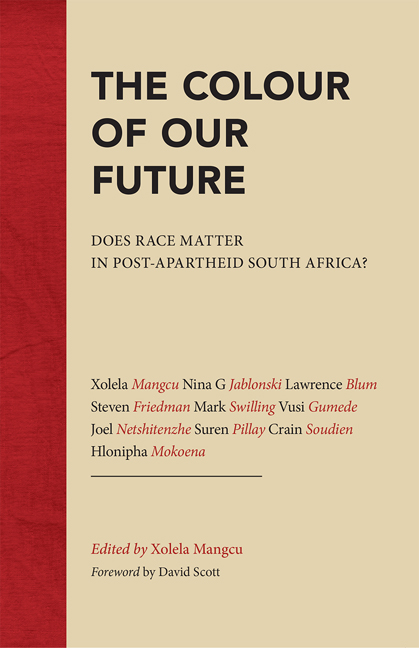Book contents
- Frontmatter
- Dedication
- Contents
- Figures and tables
- Acronyms and abbreviations
- Foreword
- Preface
- Chapter One What Moving Beyond Race Can Actually Mean: Towards a Joint Culture
- Chapter Two The Colour of Our Past and Present: The Evolution of Human Skin Pigmentation
- Chapter Three Races, Racialised Groups and Racial Identity: Perspectives from South Africa and the United States
- Chapter Four The Janus Face of the Past: Preserving and Resisting South African Path Dependence
- Chapter Five How Black is the Future of Green in South Africa's Urban Future?
- Chapter Six Inequality in Democratic South Africa
- Chapter Seven Interrogating the Concept and Dynamics of Race in Public Policy
- Chapter Eight Why I Am No Longer a Non-Racialist: Identity and Difference
- Chapter Nine Interrogating Transformation in South African Higher Education
- Chapter Ten The Black Interpreters and the Arch of History
- Notes
- Contributors
- Index
Chapter Eight - Why I Am No Longer a Non-Racialist: Identity and Difference
Published online by Cambridge University Press: 20 April 2018
- Frontmatter
- Dedication
- Contents
- Figures and tables
- Acronyms and abbreviations
- Foreword
- Preface
- Chapter One What Moving Beyond Race Can Actually Mean: Towards a Joint Culture
- Chapter Two The Colour of Our Past and Present: The Evolution of Human Skin Pigmentation
- Chapter Three Races, Racialised Groups and Racial Identity: Perspectives from South Africa and the United States
- Chapter Four The Janus Face of the Past: Preserving and Resisting South African Path Dependence
- Chapter Five How Black is the Future of Green in South Africa's Urban Future?
- Chapter Six Inequality in Democratic South Africa
- Chapter Seven Interrogating the Concept and Dynamics of Race in Public Policy
- Chapter Eight Why I Am No Longer a Non-Racialist: Identity and Difference
- Chapter Nine Interrogating Transformation in South African Higher Education
- Chapter Ten The Black Interpreters and the Arch of History
- Notes
- Contributors
- Index
Summary
So one has to act in the notion that politics is always open. It's always the contingency of failure and you need to be right because there is no guarantee except good practice to make it right …, to having the right people on your side committed to the program. So I want people to take politics a bit more seriously.
In this chapter I take up the contemporary debate on the pasts and futures of non-racialism. I am interested in non-racialism as both a form of political thinking and a mode of political practice towards a desired political end.
My aim in offering a critical appreciation of political thinking on non-racialism is to settle the question not of whether it is a good idea or a bad idea but of whether it is a useful or helpful concept at this point in the fashioning of a post-apartheid future. So the chapter is neither a history of the concept, nor an account of its origins, nor a narration of who has ideological or organisational proprietorship over it. Not that these might not be significant lines of inquiry.
I discuss non-racialism loosely in conversation with two concepts and a proposition gifted to us by the British Jamaican critical theorist Stuart Hall. The two concepts are ‘conjuncture’ and ‘strategy’, and the proposition is the possibilities of conducting a politics without guarantees.
What I am interested in here is what Stuart Hall called thinking the conjuncture we're in now. It is about interrogating conceptual, theoretical and ideological formulations as matters of strategy and tactics, rather than out of ideological or philosophical fidelity, or purity, outside of historicity.
To restate, this exploration is asking: does non-racialism, as the constellation of both a political idea and political practice, serve the purpose to which it strategically was put to work when it was deployed to resist apartheid's categorisations? Similarly, does the critique of non-racialism by Black Consciousness thinkers do the political work that it did when it was formulated to assert a political project that offered a way to think blackness not as a racial category but as a political solidarity derived from a shared experience?
- Type
- Chapter
- Information
- The Colour of Our FutureDoes race matter in post-apartheid South Africa?, pp. 133 - 152Publisher: Wits University PressPrint publication year: 2015

